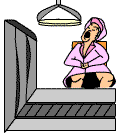Productivity
Created | Updated Mar 4, 2002

Productivity is a measurement of how much work you can get done in a given time1.
All sorts of funky tools, procedures and even management techniques have been devised to increase productivity, and thereby allow greater profits. This doesn't always go according to plan, and in most cases the inverse is true.
For example the introduction of computers into the workplace actually reduces productivity. Either the computer crashes every five minutes and you lose all of your work, or you spend all day surfing the web, reading sites like this.
Eventually you'll start to get more work done - a brief increase in productivity. This is short-lived as the software on your machine will start checking your spelling, grammar and hair colour. Then it will bring up paperclips and weird cartoon things to wink at you, and generally freak you out. Productivity is once again reduced as you exorcise the evil demons from the machine.
Management types have a technique for this situation, which is to increase the performance of the computers in the office. The argument goes that the faster the machine, the more work that can be done. Wrong. The reality is that more desktop sillies can be run at once, and you end up with the dog chasing the paperclip across the screen.
So in short, to increase productivity stop using computers, and start using a pen, paper and slide rule, or even better, try using a big stick.
